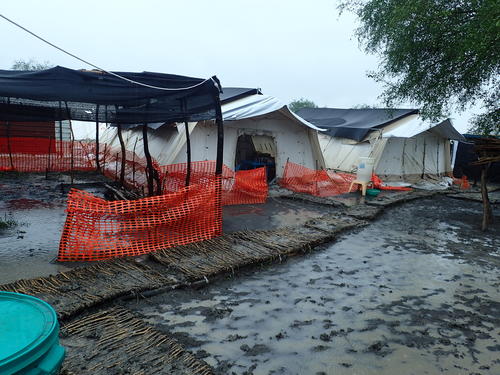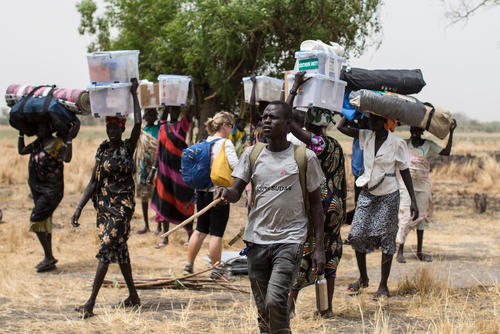Juba – Jez Goeldi knew something was wrong when he realised that the chaotic hum of the nearby market had suddenly disappeared, leaving him and his colleagues engulfed in an eerie silence. They were inside the Médecins Sans Frontières (MSF) 12-bed medical facility in Aburoc, in the White Nile, northeastern South Sudan. “The donkeys and chickens were gone, and that told me that the population had yet again been forced to flee,” says Goeldi, the 36-year-old deputy logistics coordinator for MSF.
Moments later, the silence was shattered by the pounding of artillery fire. Outside, thousands lined the muddy roads, fleeing with whatever belongings they could carry, not knowing whether they would return.
Four million citizens of the world’s youngest nation share a similar story; half of them have fled to neighbouring countries amid the violent civil war that has lasted for more than three and a half years. But for many in South Sudan’s northern Greater Upper Nile region, being forced to leave behind their homes and communities is more than just one isolated traumatic event. It is a story they have relived time and time again since the conflict began in December 2013.
Situated along the country’s White Nile Basin in the northeast, Aburoc and its surrounding areas are now a temporary home to an estimated 15,000 people. Many of those who lived in Aburoc have had to flee multiple times.
When Malakal, once the second city of South Sudan, was attacked, many of the people there fled to the town of Wau Shilluk. That too was attacked at the start of this year, forcing the whole town to flee north to the small villages of Kodok and Aburoc. Yet again the people had to take to the road when Kodok was attacked, pushing the remaining people to Aburoc.
As the availability of water and other vital humanitarian services started to deteriorate, some 20,000 people decided to make the long and dangerous journey northward, toward Sudan, while others remained in Aburoc in the hope that peace may be able to return to their areas of origin.

Living conditions in and around the settlement are terrible. The community lives in temporary shelters in close proximity to a swamp which, during the rainy season, divides the camp in two and leaves much of the terrain a muddy mess. Water is pulled from the swamp, but even when properly treated, it remains a murky yellow colour. Because clean water supplies are so low, many drink directly from the swamp, raising the risk of deadly water-borne disease such as cholera.
It is within this setting that MSF is providing emergency medical support. MSF runs a clinic with maternity and paediatric wards, inpatient and outpatient departments, an isolation ward, and a 24-hour emergency room. According to Martino, a 35-year-old MSF electrician, the facility was built with mobility and adaptability in mind. “We moved our clinic after the clashes earlier this year, as we were following people who left Wau Shilluk and then afterwards, also left Kodok,” he explains.
“This is part of our evacuation plan, to move with the community where they go,” adds Goeldi, the deputy logistics coordinator.
So when the first shots rang through the air, both MSF staff and the community knew what was in store. This time, however, the despair seemed palpable.
“An older man came and dropped to the ground on his knees,” Goeldi remembers. “He did not know what to do anymore. He just wept, in the middle of the group, like he had run out of hope.”
Over the next 24 hours, MSF teams evacuated the hospital and the people in Aburoc fled into the bush as fighting took place in and around the settlement, but this was only temporary. Shortly afterwards, realising that the conflict was short-lived, people began to return, and MSF medical operations resumed.
Despite being largely spared from the violence and being allowed to return to Aburoc, the long-term consequences of the conflict on the people are evident. “Each time people are forced to flee, they are left in a more vulnerable situation than before,” says Jaume Rado, MSF head of mission. “The fighting has put both the general population and our patients at risk. Many were cut off yet again from accessing much-needed medical care and other humanitarian aid.”
The people in Aburoc are highly vulnerable and completely dependent on humanitarian assistance, which means that the provision of food, water or works to increase sanitation and hygiene standards cannot be interrupted.




